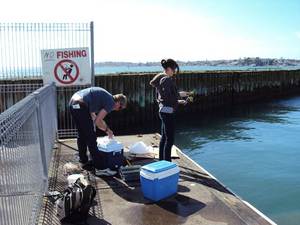 Ocean temperatures are predicted to rise by 1-3ºC by the end of this century, and new research at the University of Auckland suggests that this may bring some fish species close to their physiological limit.
Ocean temperatures are predicted to rise by 1-3ºC by the end of this century, and new research at the University of Auckland suggests that this may bring some fish species close to their physiological limit.
Tony Hickey (pictured on the left, catching spotties with student Julia MacDonald) and Fathima Iftikar, both lecturers in biological sciences, have exposed three species of wrasse from different environments – tropical, temperate and cold – to gradually rising water temperatures. In a study published in the journal PLOS ONE this week, they found that the heart was the first organ to fail as the fish experienced heat stress.
Most fish are cold-blooded, or ectotherms, and their body temperature is the same as that of their environment. As the water temperature rises, the fish warm up and their metabolism speeds up.
'What we predicted was that if the fish were from cold water, we couldn’t heat them up very much before they started having troubles. If they were acclimated to warmer temperatures, you could heat them up more than the 15-degree fish. The truth was that they were very much the same and they all struggled to be taken up hotter.'
The team kept the three fish species in tanks at temperatures of their normal environment and then warmed the water gradually, by about one degree per week. They monitored the heart beat with a device similar to what midwives use to listen to the heart of babies in the womb.
Tony Hickey told Our Changing World producer Veronika Meduna that the that the Australian tropical species Thalassoma lunare, commonly known as moon wrasse, had the narrowest thermal range and fared worse than any species in the study. "When we went to a tropical fish it was just two or tree degrees more, so they had very little scope. This research shows that the heart acts as a ‘bio-indicator’ of which species may survive rises in ocean temperature.
The study, funded through the Marsden Fund and involving Canadian and Australian researchers, found that mitochondria (power units within heart cells called) begin to fail as temperatures rise.
'The tropical wrasse could only tolerate a shift of a few degrees before experiencing changes to their mitochondria, and this resulted in a loss of efficiency so that even though the fish could acclimatise to some degree, it came at a cost.'
The life-sustaining mitochondria began to fail in all three species before full heart failure occurred, suggesting that mitochondrial failure is the most likely cause of heart failure in heat-stressed animals. The team says that changes in temperature may limit the range of environments fish can occupy. "Understanding mitochondrial function, or dysfunction, in ectotherms such as fish has important ramifications in terms of climate change and requires more study to investigate the capacity of a wide range of species to survive ocean warming."

